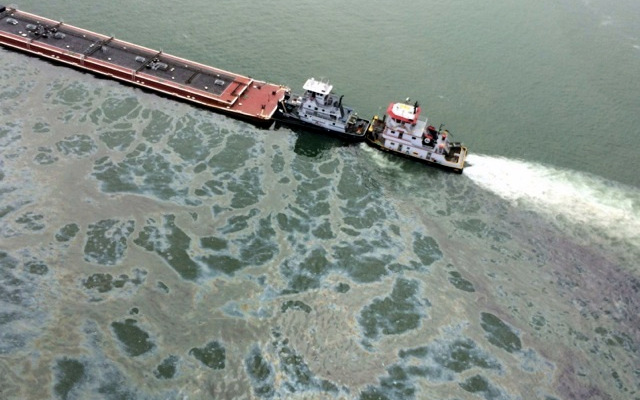
A major U.S. shipping channel closed unexpectedly on Saturday, after a ship collided with a barge carrying more than 900,000 gallons of heavy tar-like oil. Nearly 170,000 gallons of oil spilled into the Houston Ship Channel, which is equivalent to about one-fifth of the barge’s total cargo.
The U.S. Coast Guard responded quickly to the spill, transferring the remaining oil in the barge to other vessels to eliminate the risk of additional spills in a process known as lightering. The Coast Guard also announced plans to deploy about 60,0000 feet of containment booms on Monday, and it has 24 ships that will specifically focus on skimming the waterways for oil.
Despite all of these efforts, tarry black globs of oil have been detected 12 miles away near the Gulf of Mexico shore and the smell of exhaust fumes has polluted surrounding areas. This is the second barge collision to occur in the Houston Ship Channel this month. On March 14, a barge carrying fuel oil collided with a ship carrying rice. Though the cargo ship was damaged, no fuel oil was spilled.
Jim Guidry, executive vice president of Houston-based Kirby Inland Marine Corp., the nation’s largest inland barge company, said the company would take responsibility for any of the costs and that the company was not taking the incident lightly.
“We’re very concerned. We’re focused on cleaning up,” said Guidry, whose company owns both barges involved in accidents in the channel this month.
According to a statement released Sunday evening by Republican Texas Gov. Rick Perry’s office, the barge has been moved to a shipyard and is no longer in the waterway, which is the busiest U.S. petrochemical port to the Gulf of Mexico.
Though the channel, which is part of the Port of Houston, has been closed since Saturday, the Coast Guard did allow two cruise ships to travel through the area on Sunday “to minimize inconvenience to the thousands of passengers aboard and limit economic impacts from the spill.”
Typically, 80 vessels a day travel through this channel, but the Coast Guard has closed it without giving any timetable on when the channel may reopen.
Jim Ritterbusch, president of the Chicago-based energy consultancy firm Jim Ritterbusch and Associates, said if the channel is closed for a few days, the spill won’t have much of an economic impact on the country. But if the channel remains closed for a longer period of time, causing a “bottleneck of vessels in the Gulf,” he said fuel prices could increase briefly.
Since the oil was scattered throughout the water due to currents, tides and winds, the Texas City Dike, a popular local fishing spot located 700 yards from the spill site, has also been closed. Several parks near the waterfront have been closed, as well.
Cleanup efforts are underway, but it’s still not known what caused the collision between the 585-foot ship and the barge carrying about 924,000 gallons of oil. The Coast Guard and National Transportation Safety Board are currently investigating the incident, but Capt. Brian Penoyer, commander of the Coast Guard at Houston-Galveston, warned it may take some time to find out what happened, “given the complexity of the vessels and a very busy waterway.”
The Coast Guard hasn’t said whether the ship struck the barge or vice versa, but it’s believed that the collision occurred at the intersection of the Texas Ship Channel, the Intracoastal Waterway and the Houston Ship Channel. At least six people were injured, but factors that resulted in the collision, including whether fog played a part, remain unknown.
Despite the vast unknowns regarding the cause of the spill, Penoyer has stressed, “This is an extremely serious spill,” since the bunker fuel is a heavy, “bottom of the barrel” oil that does not evaporate quickly.
“This is a persistent oil. It’s a large quantity. It will spread. People should be aware of that,” he said.
Part of the concern with this “significant spill” for many environmental groups is that it occurred near shorebird habitats, and tens of thousands of “wintering” birds are still in the area.
“The timing really couldn’t be much worse, since we’re approaching the peak shorebird migration season,” said Richard Gibbons, conservation director of the Houston Audubon Society. Gibbons explained that the birds are attracted to the area because the shallow mud flats are perfect foraging habitats.
It’s not yet been determined how marine life has been impacted by the spill.
Since the spill occurred around 12:30 p.m. CDT on Saturday, it has been reported that fewer than 10 oiled birds have been found and transferred to wildlife rehabilitation centers. Anyone who comes into contact with an oil-covered bird or marine life is asked to not touch the animal and contact wildlife rescue personnel for assistance.

